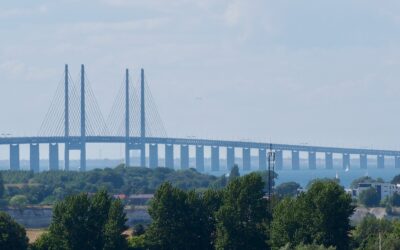A new report highlights the pressing need for an upgrade of the Oslo-Gothenburg railway route to strengthen military logistics and resilience in the STRING Megaregion.
The current single-track railway line between Oslo and Gothenburg poses significant limitations, hindering transport capacity, exacerbating congestion, and compromising operational efficiency, states new report from Risk Intelligence on the importance of the Oslo-Gothenburg railway in a defense perspective. Central to the report’s findings is the pressing need to upgrade the rail infrastructure connecting Gothenburg and Oslo for:
- Internal Resilience: An efficient railway line would bolster Sweden’s internal resilience and security by facilitating the distribution of military and civilian resources during crises.
- Allied Support: An upgraded rail link would enable the swift flow of allied support to nations in need, particularly to Norway and Finland. Investing in the modernization of the railway line is not only essential for Sweden’s national security but also aligns with NATO’s broader goals of fortifying the alliance’s northern flank, deterring potential threats, and ensuring the overall security of the region.
Chair of STRING, and Deputy Mayor of Gothenburg, Kain Pleijel, states that the report shows how important an efficient railway between Oslo and Gothenburg is:
“With this report we see a new urgency for an upgrade of the Oslo-Gothenburg railway to fulfill the NATO requirements for Sweden. An upgrade is crucial in this geopolitical landscape, as well as for trade and climate. We must have an efficient railway as the backbone of transport between our two big cities”
Double tracked railway important to secure redundancy
Double-tracking the rail lines between Oslo and Gothenburg enhances transport capacity, reduces congestion, and provides redundancy, crucial for military operations. Upgrading the rail network requires considerations for additional locomotives, rolling stock, and communication systems. Modernization efforts, including improved signals, stronger tracks, and bridges, enhance overall efficiency, enabling faster transit times and better logistics planning.
Port of Gothenburg`s strategic importance
The strategic significance of the Port of Gothenburg, Sweden’s largest civilian port, becomes paramount in facilitating military deployments. As Sweden becomes a member of NATO, the port is poised to replace the Danish port of Esbjerg, emerging as a key reinforcement hub. The military importance of the Port of Gothenburg lies in its direct access to the North Sea and indirect connection to the Atlantic Ocean, positioning it as a vital hub for logistical activities. To optimize this potential, improvements to the rail infrastructure, specifically the single-track line between Gothenburg and Oslo, are imperative.
For questions to the report please contact Managing Director of STRING Thomas Becker, thbec@stringmegaregion.org or Hans Tino Hansen, CEO, Risk Intelligence, hth@riskintelligence.eu.




